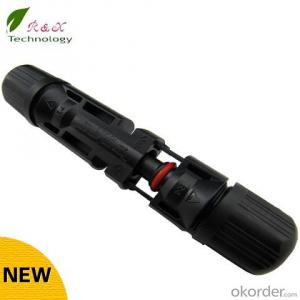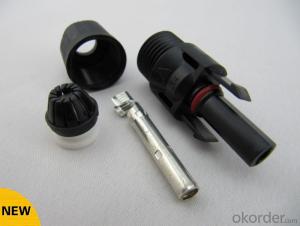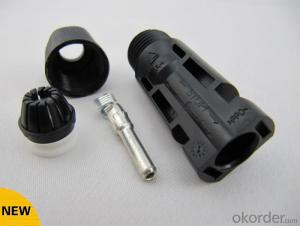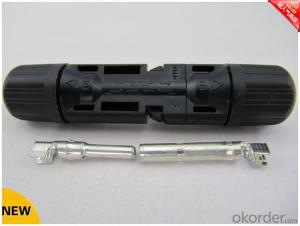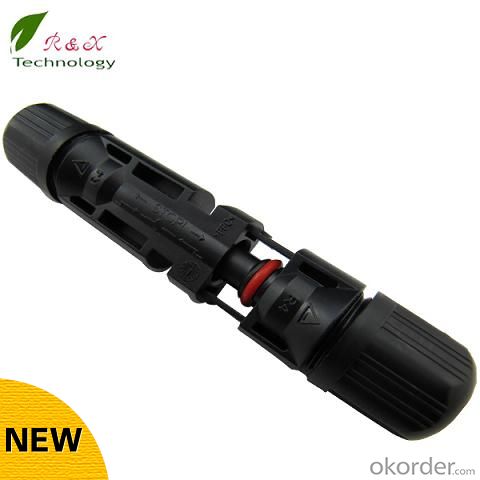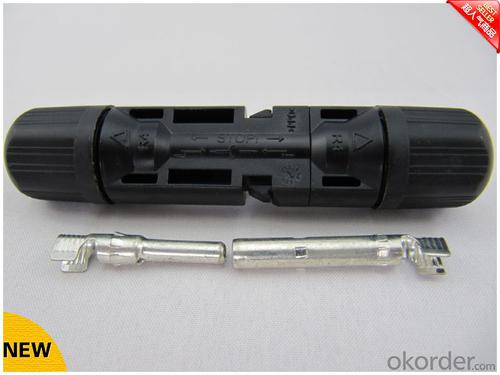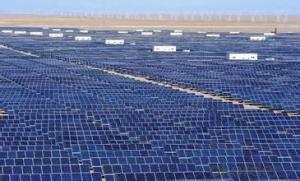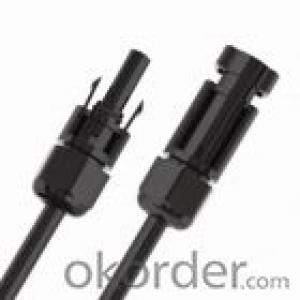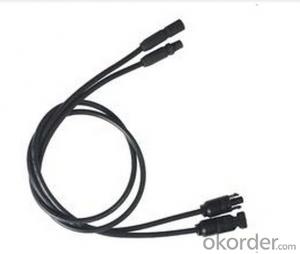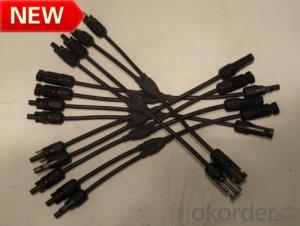MC4 Connector for Solar Energy Systems in New York
- Loading Port:
- Guangzhou
- Payment Terms:
- TT OR LC
- Min Order Qty:
- 100 set
- Supply Capability:
- 50000 set/month
OKorder Service Pledge
OKorder Financial Service
You Might Also Like
Brief introductions of product:
Connector RH4 System for photovoltaic adopts contact and insertion of reed with inner-knob type.It is used with male and famale points.pv junction box and cables made of elastomeric material and makes contact and isertion more certified by IEC61215 and TUV 2PFG1161.
Mainly parameters of product:
Rated voltage 1000V DC
Rated current 30A
Test volaage 6KV(50HZ,1min.)
Ambient temperaure range -40°C...+90°C
Upper limiting temperature 105°C
Degree of protection,mated IP67
unmated IP2X
Contact resistance of plug connectors 0.5m?
Safety class II
Contact system R4 Multilam
Type of termination Crimping
Contact material
Copper,tin plated
Locking system Snap-in(R4)
Cable type PV-F 1169 1*4mm2
1*6mm2
Design paper of product:
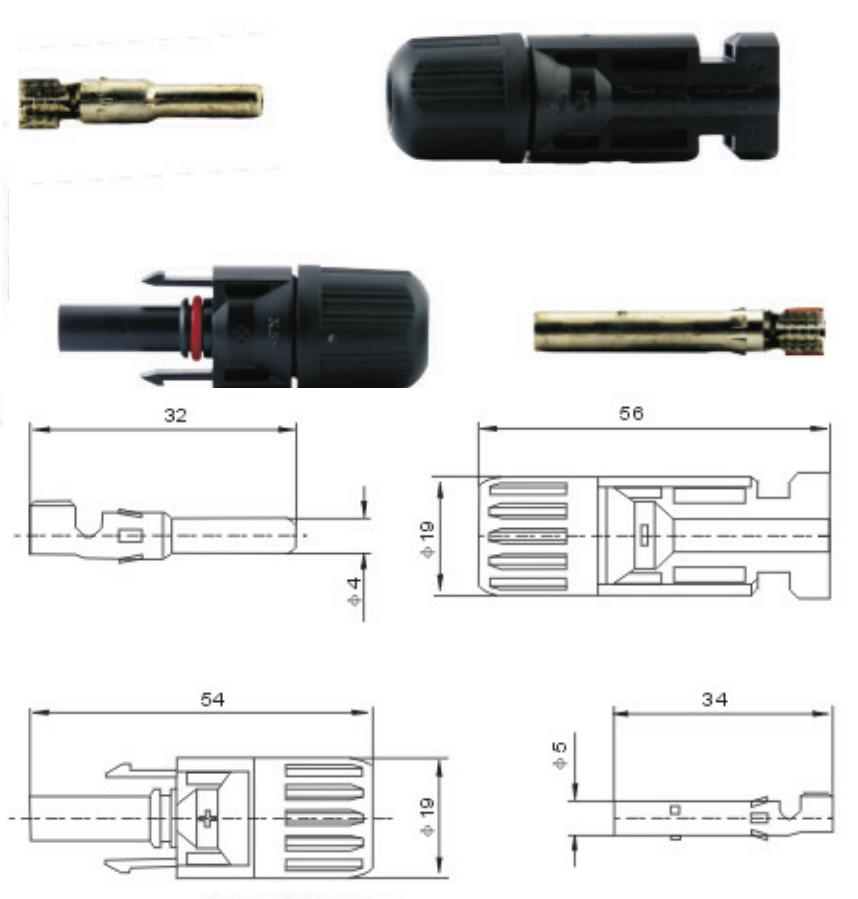
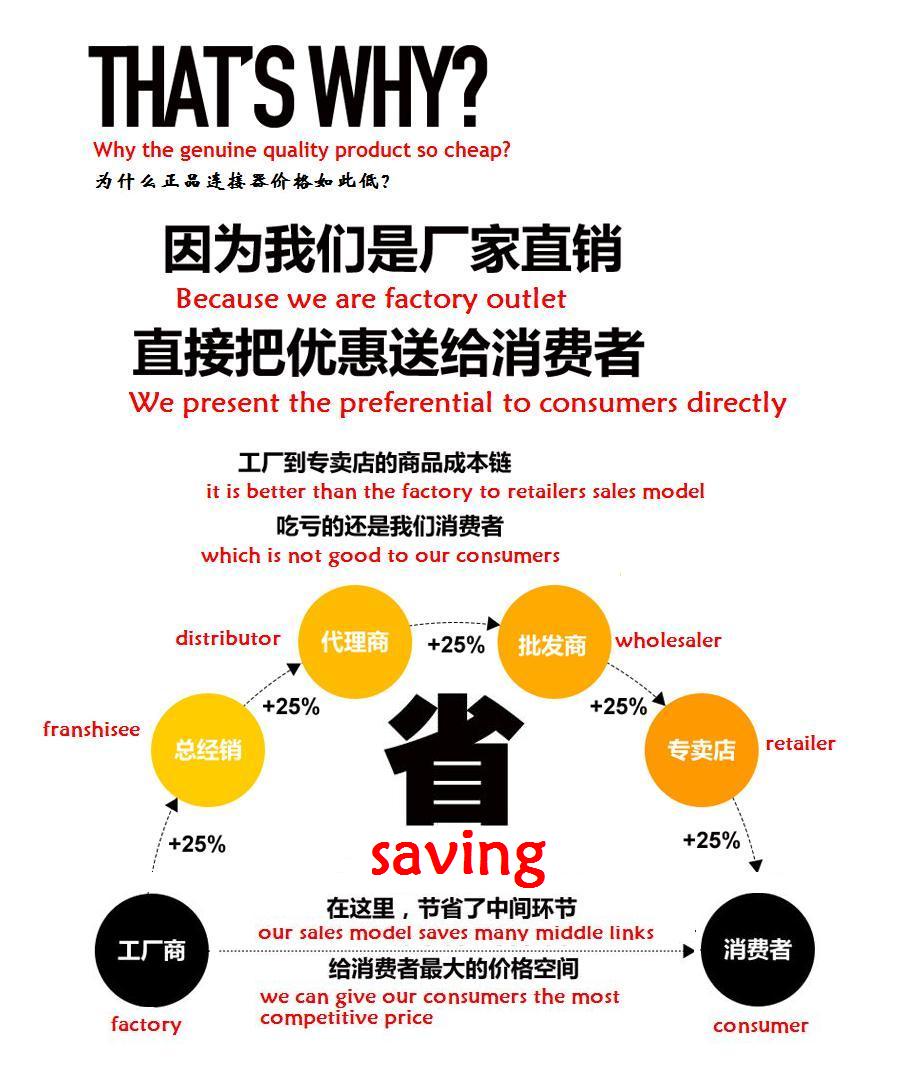
- Q: Are solar energy systems suitable for commercial buildings?
- Yes, solar energy systems are suitable for commercial buildings. They offer numerous benefits such as reduced energy costs, increased energy efficiency, and a positive environmental impact. Additionally, solar panels can be easily installed on rooftops or as ground-mounted systems, making them a viable option for various types of commercial buildings.
- Q: Can solar energy systems be used in indoor farming or greenhouse applications?
- Yes, solar energy systems can be used in indoor farming or greenhouse applications. Solar panels can be installed on the rooftops of greenhouses or indoor farming facilities to generate electricity, which can then be used to power various operations such as lighting, ventilation, and irrigation systems. This sustainable approach can help reduce energy costs and greenhouse gas emissions while providing a clean and renewable source of power for indoor farming.
- Q: Can solar energy systems be used in conjunction with other energy sources?
- Yes, solar energy systems can be used in conjunction with other energy sources. This is known as a hybrid energy system, where solar power can be combined with other sources such as wind, hydro, or conventional energy grids. By integrating multiple energy sources, it can enhance the reliability and efficiency of the overall energy system, ensuring a consistent power supply even in varying weather conditions or high energy demand.
- Q: What are the financial benefits of installing a solar energy system?
- The financial benefits of installing a solar energy system include reduced electricity bills as solar power generates free electricity from sunlight, potential savings on energy costs in the long run, decreased reliance on grid power and utility companies, potential eligibility for government incentives and tax credits, increased property value, and the possibility of selling excess energy back to the grid for additional income.
- Q: Can solar energy systems be used in powering outdoor signage or billboards?
- Yes, solar energy systems can be used to power outdoor signage or billboards. Solar panels can be installed on the roof or nearby structures to harness sunlight and convert it into electricity. This electricity can then be used to power the lights or digital displays of the signage or billboards, making them completely independent of the traditional power grid. Solar energy systems are particularly suitable for outdoor signage as they are often located in areas with abundant sunlight. Additionally, using solar energy helps reduce the carbon footprint associated with traditional electricity generation, making it an environmentally friendly choice.
- Q: Can solar energy systems be used in powering warehouses or distribution centers?
- Yes, solar energy systems can be used to power warehouses or distribution centers. Solar panels can be installed on the roofs of these buildings to convert sunlight into electricity, which can then be used to meet their energy needs. This can help reduce reliance on traditional energy sources and lower operating costs while also promoting sustainability.
- Q: Can solar energy systems be used for powering electric vehicle car-sharing programs?
- Yes, solar energy systems can be used for powering electric vehicle car-sharing programs. Solar panels can be installed on the rooftops of car-sharing stations or nearby buildings to generate clean and renewable energy. The energy harvested from these solar panels can then be used to charge the electric vehicles in the car-sharing program. By utilizing solar energy, car-sharing programs can significantly reduce their carbon footprint and reliance on fossil fuels. Additionally, solar-powered car-sharing programs can benefit from lower operating costs as they are not dependent on electricity from the grid, which can be expensive and subject to price fluctuations. Overall, integrating solar energy systems into electric vehicle car-sharing programs is a sustainable and environmentally friendly solution.
- Q: Can solar energy systems be used for greenhouse heating?
- Yes, solar energy systems can be used for greenhouse heating. Solar panels can be installed to convert sunlight into electricity, which can then be used to power heating systems within the greenhouse. Additionally, solar thermal systems can be used to directly heat water or air within the greenhouse. These systems provide a sustainable and cost-effective solution for greenhouse heating, reducing reliance on fossil fuels and minimizing environmental impact.
- Q: Can a solar energy system be integrated with other energy sources?
- Yes, a solar energy system can be integrated with other energy sources. This is known as a hybrid energy system. By combining solar energy with other sources such as wind, hydro, or traditional electricity grids, it is possible to ensure a stable and reliable energy supply even during periods of low solar generation or high demand. This integration allows for better energy management and can increase the overall efficiency and sustainability of the system.
- Q: Can a solar energy system be installed on a building with multiple levels?
- Installing a solar energy system on a building with multiple levels is indeed possible. The installation process relies on several factors, including the available space, orientation, and structural integrity of the building. In the case of multi-level buildings, solar panels can be placed on the roof, balconies, or other suitable areas that receive sufficient sunlight. To optimize energy generation, it may be necessary to install multiple solar arrays on different levels, depending on the building's design and layout. Additionally, it is crucial to ensure that the building's electrical infrastructure can support the installation of a solar energy system. By carefully considering and planning the building's characteristics, a successful installation of a solar energy system on a multi-level building can be achieved.
Send your message to us
MC4 Connector for Solar Energy Systems in New York
- Loading Port:
- Guangzhou
- Payment Terms:
- TT OR LC
- Min Order Qty:
- 100 set
- Supply Capability:
- 50000 set/month
OKorder Service Pledge
OKorder Financial Service
Similar products
Hot products
Hot Searches
Related keywords
